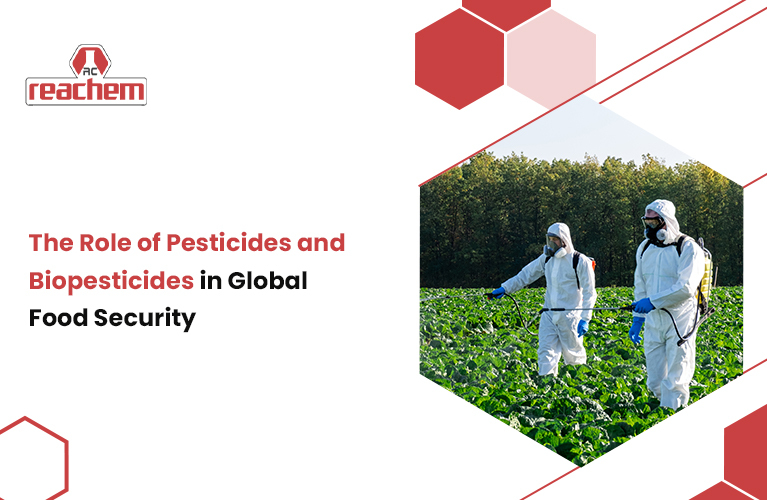wordpress-seo domain was triggered too early. This is usually an indicator for some code in the plugin or theme running too early. Translations should be loaded at the init action or later. Please see Debugging in WordPress for more information. (This message was added in version 6.7.0.) in /var/www/reachemchemicals.com/blog/wp-includes/functions.php on line 6131
In a world with a growing population, ensuring food security is crucial. Farmers need to produce enough food to feed billions of people. Pesticides and biopesticides play a key role in this mission. These substances help protect crops from pests, diseases, and weeds, ensuring higher yields and quality. This blog explores the role of pesticides and biopesticides in global food security. We’ll look at how they work, their benefits, challenges, and prospects. Understanding these tools can help us appreciate their importance in maintaining a stable food supply.
Pesticides are chemicals designed to protect crops from pests. They include insecticides, herbicides, and fungicides. Each type targets specific threats to plants.
Different types of pesticides serve various purposes. Here are the main types:
Insecticides control insect pests that damage crops. They kill or repel insects to protect plants.
Example: Using insecticides to combat aphids on wheat
Herbicides target weeds that compete with crops for nutrients, light, and space. They help keep fields clear of unwanted plants.
Example: Applying herbicides to control dandelions in cornfields
Fungicides prevent and treat fungal infections in plants. Fungi can cause significant crop losses if not managed.
Example: Using fungicides to protect grapes from powdery mildew
Pesticides offer several advantages to farmers and consumers. Explore these benefits below:
Pesticides help farmers achieve higher yields by protecting crops from pests and diseases. This results in more food production.
Pesticides improve crop quality by preventing pest damage. This means better-looking and healthier produce for consumers.
Higher yields and better-quality crops increase farmers’ profits, supporting the agricultural economy and ensuring a stable food supply.
Biopesticides are natural alternatives to chemical pesticides. They are derived from natural materials like plants, bacteria, and minerals. Biopesticides are gaining popularity due to their eco-friendly nature.
There are several types of biopesticides. Each has unique properties and uses. Here are the main categories:
These are derived from microorganisms like bacteria, fungi, and viruses. They target specific pests and are safe for non-target species.
Example: Bacillus thuringiensis (Bt) used to control caterpillars
PIPs are plants that have been genetically modified to produce pesticidal substances. These substances protect the plants from pests.
Example: Bt corn, which produces a toxin harmful to certain insects
Biochemical biopesticides are natural substances that control pests. They include pheromones, plant extracts, and natural insecticides.
Example: Neem oil used to repel insects
Biopesticides offer several advantages over chemical pesticides. Explore these benefits below:
Biopesticides are biodegradable and less toxic to non-target organisms. They pose fewer risks to the environment and human health.
Biopesticides are often more specific in targeting pests, reducing the impact on beneficial insects and other non-target species.
Using biopesticides can reduce chemical residues in food. This is beneficial for consumers and helps meet regulatory standards.
While pesticides and biopesticides have many benefits, they also face challenges. These challenges must be addressed to maximise their effectiveness.
Despite their benefits, pesticides come with significant challenges that need addressing. Here they are:
Pests can develop resistance to pesticides over time. This reduces the effectiveness of the pesticides and requires higher doses or new chemicals.
Chemical pesticides can harm non-target species, contaminate water sources, and reduce biodiversity.
Exposure to chemical pesticides can pose health risks to farmers and consumers. Proper handling and application are essential to reduce these risks.
Biopesticides also face unique challenges that impact their use and effectiveness. Here they are:
Biopesticides often have a shorter shelf life compared to chemical pesticides. This can make storage and transportation challenging.
Biopesticides may act more slowly than chemical pesticides. This can delay pest control and require more frequent applications.
Biopesticides must meet regulatory standards before they can be used. The approval process can be both complex and time-consuming.
The future of pesticides and biopesticides looks promising. Advances in science and technology are driving innovation in pest control. These are:
Precision agriculture uses technology to optimise pesticide use. This includes using drones, sensors, and data analytics to apply pesticides more accurately.
IPM combines different pest control methods to minimise pesticide use. This includes using biological controls, cultural practices, and chemical treatments as needed.
There is a growing focus on developing sustainable pest control methods. This includes reducing pesticide use, promoting biopesticides, and enhancing biodiversity.
These advancements are paving the way for a more efficient, eco-friendly approach to pest control.
Pesticides and biopesticides play a vital role in global food security. They protect crops from pests and diseases, ensuring higher yields and quality. While both have their challenges, advances in technology and sustainable practices offer hope for the future. Understanding the importance of these tools can help us appreciate their role in maintaining a stable food supply. As the world faces increasing food demands, the role of pesticides and biopesticides will continue to be crucial in ensuring food security for all.